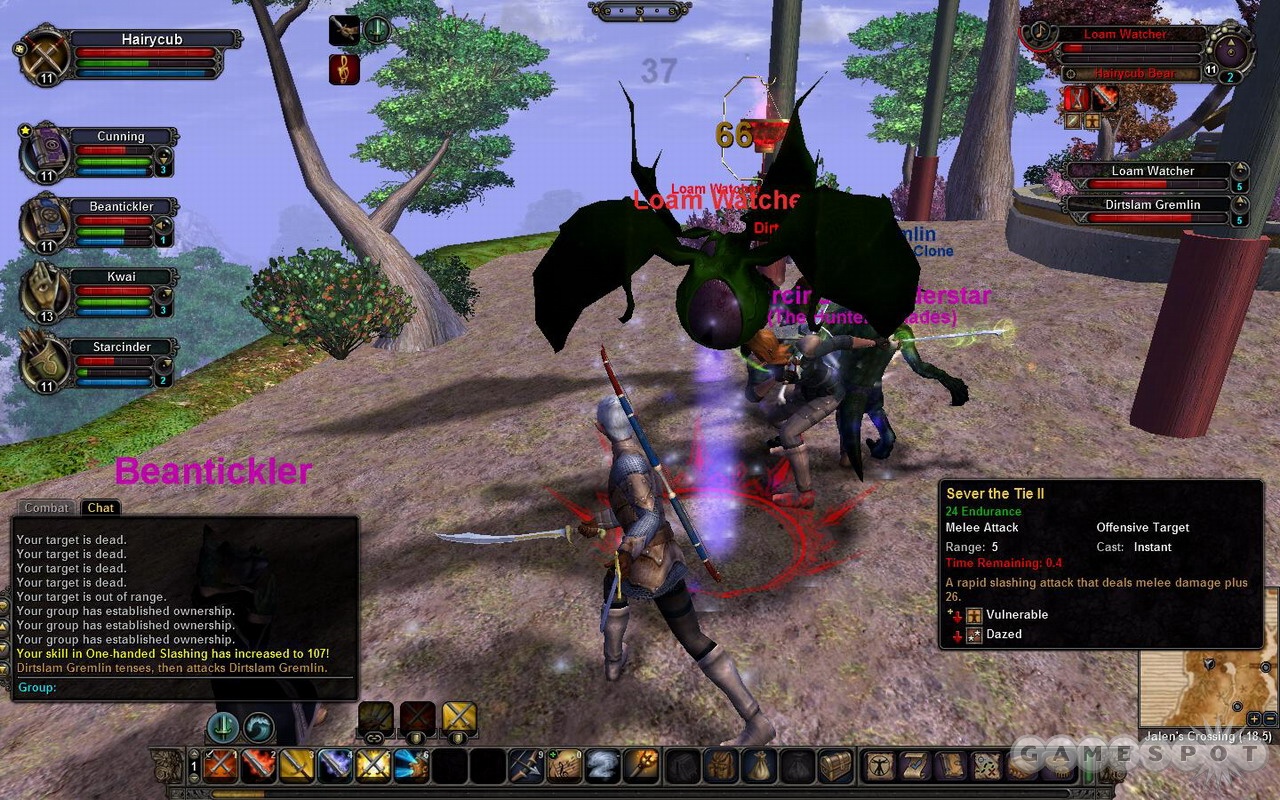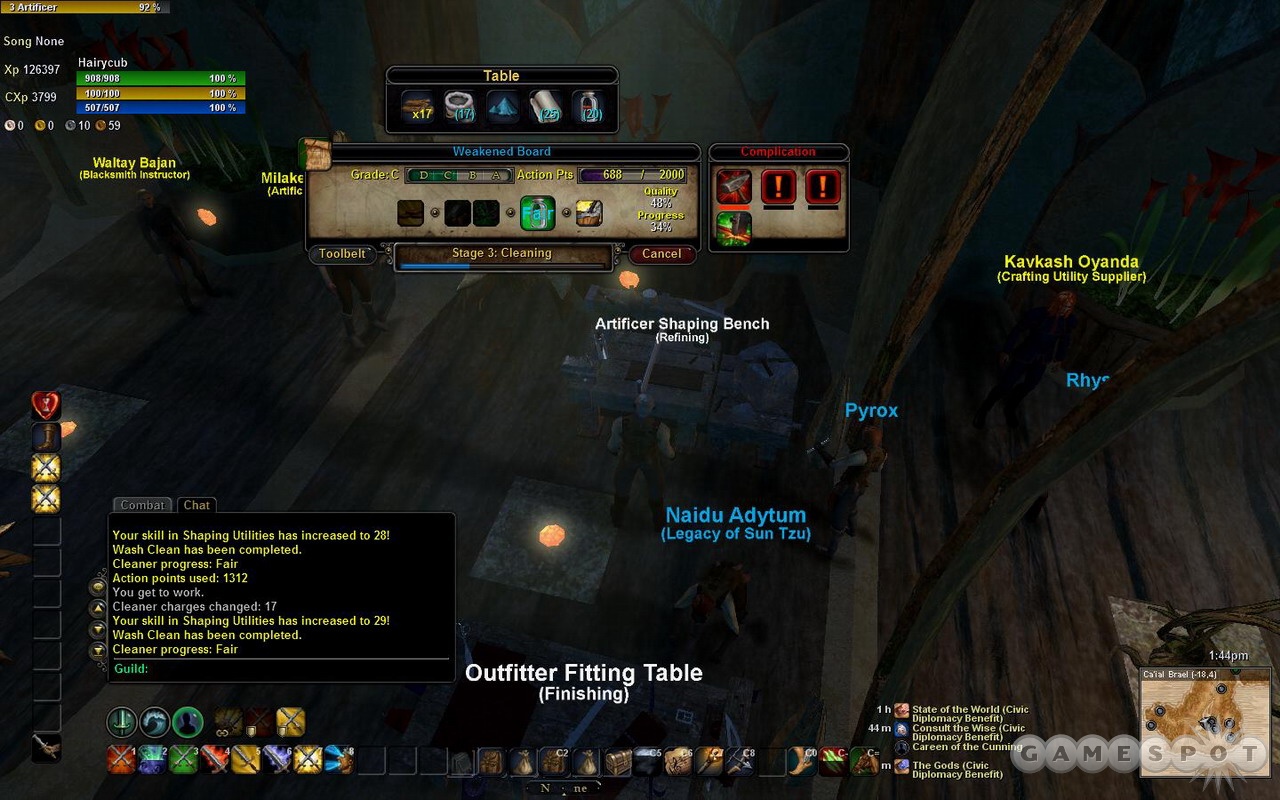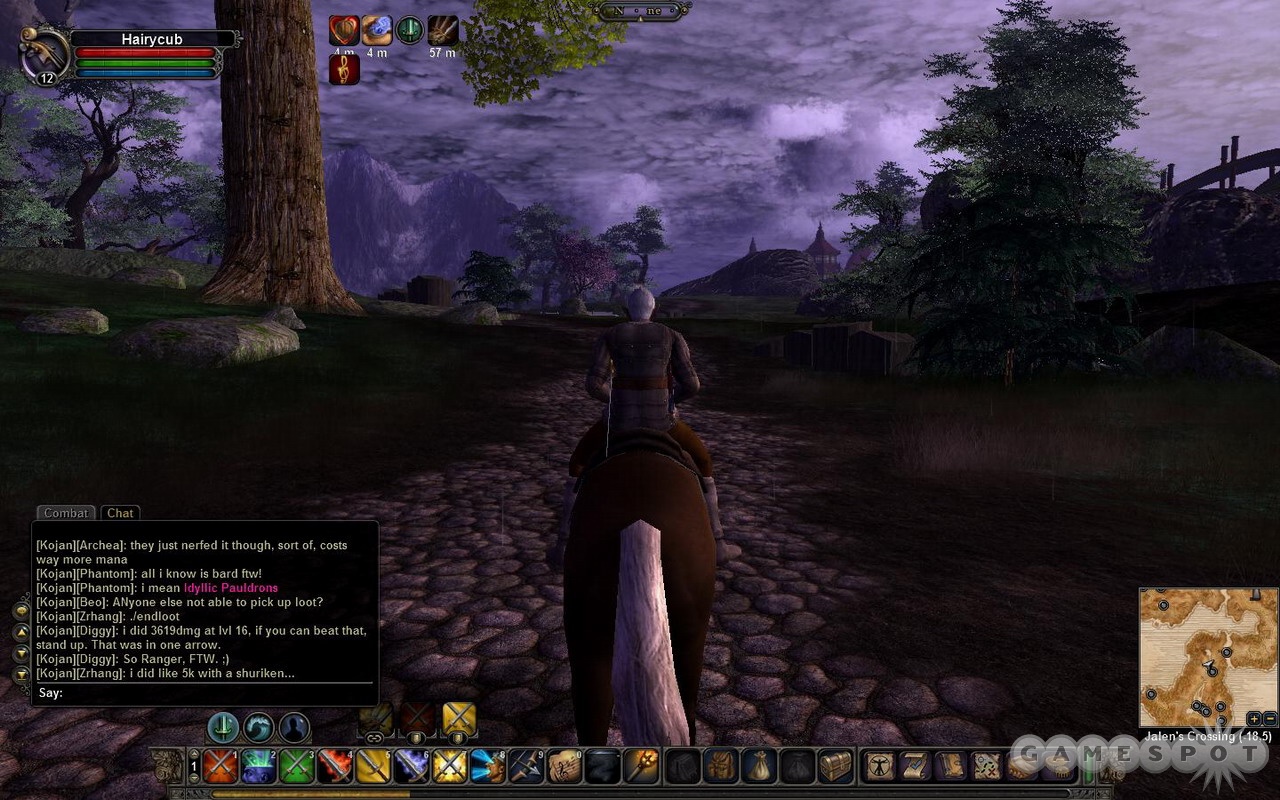Since the release of Blizzard's monumentally popular World of Warcraft and its expansion, it's been impossible for new massively multiplayer online role-playing games to avoid the inevitable comparisons. That's probably for the best in the case of Vanguard: Saga of Heroes, for while the aforementioned games have some superficial similarities to this one, their core designs are far different. Vanguard, for better or for worse, hearkens back to the days of EverQuest, when in-game death was more than just a slight annoyance and groups camped for bosses that rarely spawned. But by doing its own thing, Azeroth be damned, Vanguard sets itself apart, thanks to complex crafting and a wholly unique take on non-player character communication. It's also rough around the edges, exhibiting all the bugs and glitches of a game not quite ready for release. Yet while Vanguard is not outwardly friendly to genre newcomers, it's got enough rewarding gameplay to please experienced adventurers willing to overlook its technical hitches.

In Vanguard, home is the world of Telon, which features three main continents, 19 races, and 15 classes. While many of the choices seem fascinating, most of them boil down to archetypes and group roles familiar to anyone who's played an MMORPG before. There are a good number of ways to modify your avatar's physical appearance, so you could easily spend quite some time deciding on the look and purpose of your character. Once in the game, a system of pop-up messages guides you through the beginning steps, and you're off to explore, quest, and level. The starting quests are genre standards familiar to anyone who's played an MMORPG before, but once you've gained a few levels, you'll find just how daunting Telon can get.
The first and obvious challenge once you are around level seven is that, like it or not, Vanguard isn't for the solo player. That isn't to say it's devoid of content for the lone adventurer, but consistent soloing is a good way to get quickly frustrated. Most quests are obviously designed for groups, even if they're not necessarily identified as such in your quest log, and soloing what should seem like a simple mission can result in quick death if you aren't careful. Even with a full group, some areas and dungeons can be a time-consuming challenge, particularly because Vanguard doesn't feature any instanced quests. As a result, you might need to wait a while before the boss you need to vanquish reappears after the last group's battle. Multipart group quests may take three or four hours to get through, and even with a good party, a simple mistake can cost you your character's life.
That cost can be pretty high, since resurrection entails experience loss and a trip back to your corpse, assuming you want to regain some of that XP. You may summon your tombstone at an altar, but at higher levels, the amount of time you need to put into regaining all the lost XP is intimidating. In any MMO, returning to your corpse in a monster-infested dungeon may be next to impossible, and the additional loss of experience often makes the penalty even more frustrating in Vanguard. There's no experience loss by falling to the sword of another player on the free-for-all player-versus-player server, which eliminates the need to retrieve your corpse but means your killer can loot up to 15 percent of the coin you're carrying. Conversely, a second PVP server groups races into two separate teams. Along with the usual duels common to the genre, that's the only PVP content Vanguard offers on US servers.
But if exploring Telon is riskier business than we're used to seeing in MMOs over the last few years, the combat itself is satisfying and fun. Much of this is related to the reaction system, which grants you multiple spells and abilities that can be triggered only if certain criteria are met. For example, a successful parry may open up a counterattack not normally available. Because those attacks can be powerful, managing your skills and available energy adds some welcome strategy to your choice of spells at any given time. Chain attacks and bard songs, among other class abilities, make battles feel dynamic, especially considering your avatar doesn't need to stand still to perform most skills.

Vanguard's most fascinating feature is diplomacy, which lets you earn favor with various factions, area-wide buffs, and more by engaging NPCs in conversation. Parleying is a simplified strategy card game in which you play five cards that represent different types of statements, such as flattery and inspiration. A game board with an influence marker keeps track of how you are doing, and as long as you keep the marker on your side for the specified number of turns, you win the parley. As your skills improve, you earn new cards--and even gain the use of temporary cards when visiting certain areas. Parleying itself is pretty simple, although as you gain skill, winning a high-level conversation gets to be quite a challenge.
Even with three distinct continents, Telon doesn't feel very unique compared with any other fantasy world, nor do your adventuring quests make you feel all that involved with the scattershot lore. However, the addition of diplomacy not only rescues the splintered backstory, but makes it feel more personal than it otherwise would, because each statement hinges on your performance within the parley. Keeping the marker on your side of the board is key not just to winning the conversation, but to uncovering the next bit of information. By giving you an active role in your exchange with the NPC, Vanguard makes you look forward to what the NPC has to say. And because the dialogue is written well, diplomacy never feels like pointless busywork in a quest to raise your standing in one faction or another.

There's also plenty of crafting and harvesting to do, and making a finalized and useful product is a complex and lengthy task compared with crafting in other MMOs. Creating a single item requires a recipe, multiple tools and components, and a particular workbench. When you begin the session, you have a number of action points to spend and multiple steps to work through, and each step spends points while contributing to either the progress or the quality of your product. Additionally, crafting complications that need additional components or tools can crop up. For example, if your character is injured while working, he may need to mend his wounds, which requires bandages and uses up skill points. You can also earn coin and skills by doing work orders, which are crafting missions that have you creating and returning various goods. It's an involved process to be sure, but producing a high-quality product is appropriately rewarding.
Vanguard's most unfriendly characteristic is its instability. To its credit, it launched without a hitch, and server disconnects are relatively uncommon. Unfortunately, a number of other bugs infest the game. Respawning at an altar or teleporting to another continent may result in your character appearing inside the world geometry, underwater, or in midair. Lost quest items, random appearance changes to avatars, and other frustrating issues have popped up frequently in the weeks since release. Even turning on antialiasing functions on your graphics card can cause your screen to go black, flicker, or hide the character names over avatars. Lag spikes will hold up combat for several seconds, or even cause an action in progress to stop while still costing you the time or energy the skill requires.
Many of the visual bugs result from Vanguard's lack of support for full-screen antialiasing. Surprisingly, though, this missing feature doesn't have much of an impact on the beauty of the visuals. Many of Telon's vistas are stunning, from both an artistic and technological standpoint. The lush foliage and colorful Asian architecture of Kojan is one notable example, but exploration on all three continents reveals plenty of dramatic landmarks. The splendor doesn't translate evenly, though. The native, barren environments of Qalia are inconsistent, and many of the dungeons and enemies are graphically uninspired. But as pretty as most of it is, the game engine has difficulty keeping up. A top-notch system is required to see Telon in all its glory. Even on a high-performance PC, Vanguard is a system hog, requiring a lot of muscle and some adjustments to the graphics settings to run at a stable frame rate.

The soundtrack is attractive and often evocative. Musical tracks like the vocal elven swooning in the city of Ca'ial Brael and the Arabic strings of Khal reflect the local environment perfectly. The swooping harp glissandos and angry cello grumbles of diplomatic exchanges are also noteworthy. The din of combat and ambient noises are what you would expect, although some enemies are eerily silent when attacked. Just don't expect the pleasant NPC chatter from EverQuest 2, or witty WOW-ish quips; NPCs in Vanguard mutter a small number of short phrases, and most of them are delivered without a hint of enthusiasm.
Features like player housing and boats for travel extend Vanguard's shelf life for players approaching the top level of 50, and even with plenty of room for future questing content, there's plenty to see and do. But Vanguard is undoubtedly not for everyone. Multiple bugs, forced grouping, and a vocal player community sensitive to criticism currently keep players looking for an easygoing adventuring experience at arm's length. But Vanguard gets a lot right, and the engaging combat and nifty diplomacy are more than enough reason for genre enthusiasts to give it a shot.